In August this year, just two months before his death, I was invited to interview Lou Reed (full disclosure: it was a joint interview with the Quietus). It was an opportunity I couldn't pass up, but one I was also wary of accepting: after all, Lou didn't always get on too well with us journalists.
Lou was being interviewed with his longtime friend and collaborator, the photographer Mick Rock. A book, called Transformer after Reed's 1972 album, had been published of Mick's photos, charting Lou's transformation from underground pin-up to cult icon between 1972 and 1980. I was, understandably, quite nervous. I fully expected to turn into my stammering, scarlet-faced teenage self, as I was a huge fan. I first bought Transformer on cassette at the age of 12 because I liked the cover, and I have now been listening to Lou's music for 20 years. He became a huge influence on my life, from how I dressed and the colour(s) of my hair to – at least to some degree – the course of my career.
Our turn to speak to Lou came at the end of a long press day, when subjects have invariably been weathered by answering the same questions over and over. After an anxious four-hour wait, Lou appeared with his wife, Laurie Anderson. "The thing I like about Lou," his manager had told me during the wait, "is that he could have had any girl he wanted, but he loves Laurie so much." Gazing through the glass partition, I could see them talking sweetly between the interviews. "Don't mention David Bowie's album," his publicist warned, half-jokingly, as the interviewer before me left. "The last guy who did that got the wrong side of Lou."
People always say you shouldn't meet your idols, that you'll only be disappointed. But when I walked in the room a peal of laughter greeted me. "Finally!" he leaned back. "What I've been waiting for – a woman!"
He was looked delicate. Quite startlingly so: traces of his liver transplant were easy to spot, and a huge bandage covering his belly was revealed when he used the edge of his shirt to clean his glasses. Still, his eyes – glassy and bright – danced around the room and softened as they fell onto my (lucky) T-shirt (which I wore especially) and his face, although creased like a well-loved toy, was still very handsome. He was sparkly, witty and happy to talk about the past. It was almost unnerving. "I was a product of Andy Warhol's Factory," he said. "All I did was sit there and observe these incredibly talented and creative people who were continually making art, and it was impossible not to be affected by that." On Andy, he said, "he was somebody who created himself. You know, there he was as a balding commercial artist who took himself off to God knows where and reinvented himself as this guy in a leather jacket and a wig."
We talked a while about the wig. "I asked him about it because I thought it made him look older," he said, smiling, "and Andy said: 'well that's fine because when I do get older it'll be perfect.'" A bit like Robert Johnson's story, he was asked [see footnote]. "I wish I could tell you it was like that for me. You know, that I heard a voice at midnight say, 'Lou … Lou … this is what you'll be doing for the rest of your life'".
Lou was obviously thrilled to be with Mick, the pair riffing off each other and going over Mick's documentation of the past, particularly some of the clothes he wore back then. "It was Angie Bowie who gave me the studded jacket and those velvet pants, but really it was just a more glamorous version of what I was wearing."
"It's funny," he added, "I see women doing now what I was doing then, like painting patterns on their fingernails, and it makes me laugh." And then, somehow, we got onto tattoos. "Back then one person would, say, get a tattoo on their dick and everyone would say 'how's your dick doing?' Now everyone's got their dick tattooed."
It wasn't all light. As we talked about modern art, he seemed bored. Or, more to the point, keen to express his boredom. "[Back then] it was punk rock the way it should be: adventurous. It was about being creative, offering something different. The problem is that no one is really making great art any more." So what was his main thrust in the beginning, his driving force? "I was trying to smash through things. Music should come crashing out of your speakers and grab you, and the lyrics should challenge whatever preconceived notions that listener has." And how does that compare to now? "We are living in a compressed age where people are perfectly happy to listen to the worst kind of recorded shit imaginable. And who buys albums anymore? People are too busy downloading singles or just single tracks and that isn't very healthy. I see people watching movies on their phones or iPads, and don't they realise that they're missing so much?"
As I left the dark womb of the recording studio, I took stock of what had just happened. I'd met my punk rock hero, and he wasn't an arsehole. Just a really sweet, funny old man. Maybe he couldn't be bothered to be an arsehole anymore – and that's quite punk in itself, isn't it?
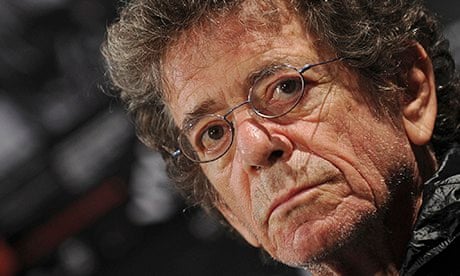
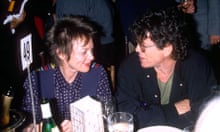
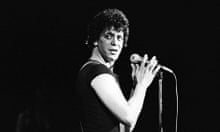
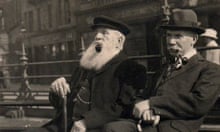
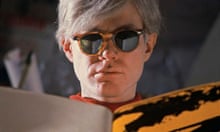
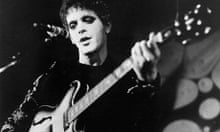

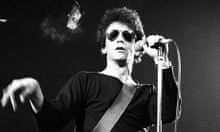
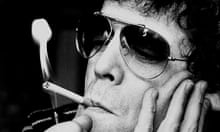


Comments (…)
Sign in or create your Guardian account to join the discussion